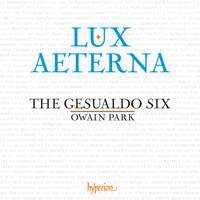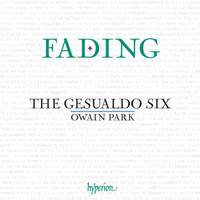Interview,
Owain Park on Lux Aeterna
 With the death of Elizabeth II still fresh in many people's memories, and the commemorative mood of early November (All Souls', All Saints', Armistice Day) turning minds towards contemplative reflection, the Gesualdo Six's new album Lux Aeterna is apposite both to the recurring annual calendar and to a once-in-a-generation loss of a public figure.
With the death of Elizabeth II still fresh in many people's memories, and the commemorative mood of early November (All Souls', All Saints', Armistice Day) turning minds towards contemplative reflection, the Gesualdo Six's new album Lux Aeterna is apposite both to the recurring annual calendar and to a once-in-a-generation loss of a public figure.
Combining a range of "true" sacred works with a number of settings that sit slightly off to one side from conventional religion, including Douglas Guest's ever-popular For the Fallen and Park's own collage-like First World War meditation In Parenthesis, it is an exploration of the broad theme of remembrance, assembled into the kind of thoughtful programme in which the Gesualdo Six excel.
I spoke to the group's director Owain Park about where this album came from and the various subtly different angles from which it views that central commemorative idea.
With the world still in many ways reeling from the onslaught of the Covid-19 pandemic, it’s tempting to see this album as a response to the sense of collective loss from 2020 and 2021. Would that be accurate, or was it in the works before that?
It wasn't in the works pre-Covid - so it's a little bit of a response to that, or at any rate a reflection on it. Being more mindful of that kind of collective trauma. But also we wanted to make it quite general, because at any time in someone's life they can be faced with grief, eliciting an incredibly personal response. So it was more a reflection on that - and also a desire to work out how we could programme together some of the pieces that we'd been performing by themselves, bringing them together as a coherent programme.
Some of these pieces inevitably required transposition, reflecting the fact that your top line is comprised of altos rather than sopranos – does this ever cause problems or even make a piece impossible to perform?
Thankfully, on this album at least, things like the Rodney Bennett, the Morales, the Byrd and everything else were conceived in these pitches to begin with, so we were able to work with that. But when we are faced with the need to transpose things it becomes a balance of how much it changes the sonority of the piece. It's important not to go too far from the composer's original intentions, while acknowledging that some of the music is really lovely to perform in the new keys.
On this album, in general we're doing things faithfully to what the composers wanted, and therefore making it work for our voices.
So the things like the Tallis In ieiunio are actually in the original key?
I believe so, yes. Which creates this issue with the top part, of who sings it - it's not an alto part really, it's too low, but then again it's not really a tenor part. So Joseph is doing some extraordinary vocal pyrotechnics on the top. Generally we want to retain the composer's concept for a piece while also being able to perform it. It's a delicate balance.
Donna McKevitt isn’t a composer normally associated with choral or consort music; how did your collaboration with her, that resulted in Lumen, come about?
It was just one of these things where we'd interacted with her online somehow - quite serendipitous. And she suggested that she might like to write something for vocal forces, to get away from her usual style. So she wrote us one piece that isn't on the album, and we worked on that a bit, and then she wrote Lumen which we include here, and which fits in beautifully with the whole theme.
Although it sets the words of the Nunc Dimittis, it doesn't include the Gloria that would come at the end in a liturgical setting - could it be used in a service context?
It has the possibility of performing it in Compline, or something like that, because you can add a separate Gloria. But it's quite a hypnotic piece, so you could use it alongside pieces like the Tavener or the Skempton as a piece which creates a mood - and then you can place things around it that reflect it. It's a really interesting setting. And I'm sure that if people wanted to use it liturgically she'd be able to add a Gloria at the end!
There are quite a lot of pieces like that on this album - pieces that are sacred-ish, but not liturgical, sitting in that in-between place...
Yes, and I think that's a kind of response to the fact that for a lot of people, the major events of life - weddings, funerals etc - do still take place in a church but are potentially slightly more removed from it. So to have that sacred feeling while also being less overtly religious is important.
Your own composition In Parenthesis is an impressionistic, almost postmodern, collage of visions from the First World War; can you tell us some more about how you put this piece together?
I had already written a piece along those lines for the Opus Anglicanum ensemble; the first one was a fantasia on English children's songs, so again a patchwork of lots of different melodies and weaving them together in a slightly more coherent compositional sense.
With In Parenthesis there was the addition of the spoken part, but they wanted the voice to be as one with the singers while also being at a remove. You get a kind of stream-of-consciousness effect from both sides, and sometimes it feels like they don't really meet, but the music is able to thread it all together. It's supposed to be slightly dreamlike and to take the listener on a journey through lots of different soundworlds of that era.
The Renaissance works on this album represent facets of how sixteenth-century Christians thought about death and loss. Do you think there’s a similar consensus among the contemporary works, reflecting how our own society handles these things?
I don't know; I'm not sure whether the composers are thinking along those lines, and I suspect they're each just writing their own music and leaving it at that. It's maybe more our job as programmers to work out what fits together and what tells a story, and where that collective conscience is. And because there are a whole plethora of texts available to us now that weren't around in the Renaissance, there's a whole load of different ways you can interpret things and bring them together.
What's really interesting is approaching an ancient text with a contemporary composer, and find those concordances with older settings.
Akin to finding new resonances in the ancient Compline service on your previous album Fading?
Yes - I feel that Lux Aeterna leads off from that very naturally, actually. The Neil Cox Keep me as an apple almost feels like it joins onto Fading and the rest of Lux Aeterna comes out from it. A different tangent of course - not a religious service but perhaps more of a sacred "occasion".
What we've found is that both programmes tend to work really well in concert. Especially with this one - we don't have any applause in the middle, and if we do it with no interval it's about seventy minutes. And by the end, people are a bit overwhelmed and are really taking time to reflect on what they've heard, which I think is a sign of good programming. You want people to go away feeling something.
Within the world of small vocal consorts, you're quite far removed from the more entertaining approach of, say, the King's Singers. Do you ever find your audiences wanting more of that kind of music?
Not any more. We did in the early days, but now since we've been going for a little while longer and we've got a bit of a history of our own, that gives people a knowledge of what they might expect. I totally love the fact that occasionally we turn to that kind of thing, and we're grateful for the legacy of people like the King's Singers for providing it, it's nice to have our own focus. It suits our programming, our venues, our diary and everything else - it works very well.
Samuel Mitchell (narrator), The Gesualdo Six, Owain Park
Available Formats: CD, MP3, FLAC, Hi-Res FLAC
The Gesualdo Six, Owain Park
Available Formats: CD, MP3, FLAC, Hi-Res FLAC, Hi-Res+ FLAC




